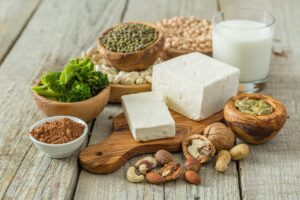When people talk about a high-protein diet, many people associate products such as meat, fish, eggs, or dairy products with it. A vegetarian or even vegan diet, on the other hand, is more likely to be associated with deficiency symptoms. However, the nutritional trend is moving more and more in the direction of vegetarianism and veganism, and competitive athletes are also convinced with their performance despite a vegan diet.
It is therefore worth taking a closer look at vegan protein sources. We have examined 10 vegan foods that are real protein bombs, provide fiber, and are also rich in minerals and vitamins. That’s why a vegan lifestyle is anything but low in protein and makes a positive contribution to a healthy and sporty lifestyle.
Vegan protein sources: what is there to consider?
As with animal protein sources, there are also differences in vegan protein sources. While fruits and vegetables are less rich in protein, legumes, nuts, and grains are higher in protein. Chickpeas, lentils, and co are real protein bombs, just like soy protein. They have a complete amino acid profile and optimally cover your protein requirements throughout the day. However, there are a few things to keep in mind when it comes to vegan protein sources.
What is my protein requirement?
Before putting together your nutrition plan, you need to determine your daily protein needs. According to the World Health Organization and the German Society for Nutrition, the protein requirement of an adult is 0.8 g per kilogram of body weight. From our point of view, this is far too little, especially in sports or vigorous physical activity.
We recommend 1.5 g-2 g per kilogram of body weight for those who are active in sports, do weight training, and want to build muscles. Don’t worry, you can’t overdose on protein, because the body excretes what it no longer needs via the liver and kidneys.
Vegan protein sources vs. animal protein sources
Vegan protein sources have a reputation for not being as rich as animal protein sources. This assumption is incorrect because plant-based protein sources will also get you a little closer to your goal of building muscle. What is true, however, is that animal protein sources contain all the essential amino acids, which is not the case with vegan protein sources.
In order to get a full amino acid profile, there is a very simple trick: combine several plant-based protein sources and you are well taken care of. With this solution, vegan athletes come close to the amino acid profile of animal protein sources.
Why combine vegan protein sources?
Proteins are made up of amino acids. The body cannot produce essential amino acids itself and must be ingested through food. It is therefore important that the protein sources are combined in a vegan diet, as they usually contain a particularly large amount of one amino acid. The combination of several amino acids then forms complementary proteins that provide your body with sufficient protein.
These foods are great for combining:
- Legumes: Peas, beans, lentils, soybeans, and peanuts are low in sulfur-containing amino acids such as cysteine and methionine and high in lysine and isoleucine.
- Nuts and seeds are low in threonine, tryptophan, lysine, and sulfur-containing amino acids and rich in arginine and acidic amino acids such as aspartic acid and glutamic acid.
- Vegetables and fruits only have a lower overall protein content, but they contain a proportion of the amino acid lysine, which compensates for the low content in nuts and seeds. This combination is therefore particularly suitable.
Vegan BCAAs
A beneficial combination of vegan protein sources would therefore be grains and legumes. Thus, the body is supplied with sufficient sulfur-containing amino acids, methionine, and lysine. From these building blocks, the body can wonderfully build the macronutrient protein. The key here is a balanced diet and combining lots of foods to be optimally positioned for exercise and muscle building.
10 vegan protein sources
In the following, we have compiled 10 vegan protein sources for you and examined them a little more closely. This selection should not be missing in your nutrition plan if you pay attention to a sufficient protein intake.
1. Seitan
With up to 28 g of protein per 100, it is at the top of the vegan protein sources. Seitan is a meat substitute made from wheat protein and can be used in a variety of ways in salads, fried or sliced.
2.Nuts & Kernels
A real protein bomb with up to 22 g of protein per 100 g. They are ideal as a snack between meals or as a topping in salads or porridge. But beware: Nuts contain a high proportion of fats and should therefore be used sparingly. A handful is enough.
3. Tofu
With up to 18g of protein per 100g, it is trendy in various dishes. It can be found in bowls or fried and comes in all sorts of variations.
4. Tempeh
With up to 20 g of protein per 100 g, it is similar to tofu and consists of soybeans. You can fry tempeh and eat it in curry or on salads.
5. Oatmeal
With up to 13 g of protein per 100 g, it is a suitable source of protein for your breakfast. Because they contain a lot of fiber, they also keep you full for a long time and swell up in the stomach. They are wonderful for porridge.

6. Lenses
With up to 12g of protein per 100g, lentils are legumes found in soups, salads, or stews. They are high in minerals and fiber and are a very healthy vegan source of protein.
7. Beans
With up to 9 g of protein per 100 g, they are very popular as an accompaniment to meals. Kidney beans are slightly higher in protein than their green cousins.
8. Chickpeas
With up to 9 g of protein per 100 g, chickpeas have a very high proportion of essential amino acids and are very popular in salads or as hummus.
9. Quinoa
With up to 4.4 g of protein per 100 g, the vegan protein source is called a pseudocereal and can be used as a side dish. Quinoa can also be used in salads or patties.
10. Broccoli
With up to 3 g of protein per 100 g, it is the front runner among vegetables. If you’ve been wondering why bodybuilders tend to turn to broccoli, here’s your answer. In addition, it is rich in vitamins C and K.

